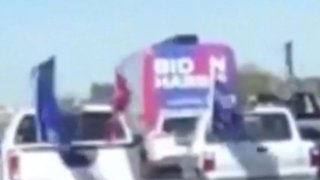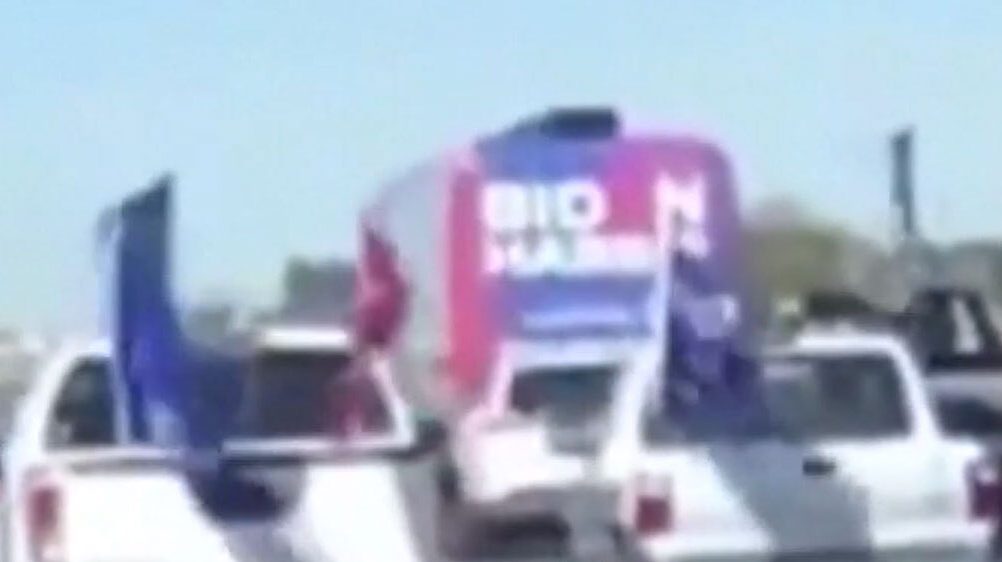
A federal trial began Monday over claims that supporters of former President Donald Trump threatened and harassed a Biden-Harris bus in Texas four years ago, disrupting the campaign on the last day of early voting.
In opening statements, the plaintiff's lawyer argued that the six "Trump Train" drivers participated in an orchestrated attack aimed at intimidating people on the bus and making the campaign cancel its remaining events in Texas.
"This Trump Train was different because it had a target," attorney Samuel Hall said. "We're here because of actions that put people's lives in danger."
The defense argued that the drivers did not conspire against the Biden-Harris campaign bus that day and instead joined the train as if it were a pep rally. They also claimed that the bus had several opportunities to exit the highway from San Antonio to Austin.
Get top local stories in DFW delivered to you every morning. Sign up for NBC DFW's News Headlines newsletter.
"It was a rah-rah group that sought to support and advocate for a candidate of their choice in a very loud way," attorney Francisco Canseco said.
The civil jury trial over the so-called "Trump Train" comes as Trump and Vice President Kamala Harris race into the final two months of their head-to-head fight for the White House in November.
Democrats on the bus said they feared for their lives as Trump supporters in dozens of trucks and cars nearly caused collisions, rammed a Biden-Harris campaign staffer's car and forced the bus driver to repeatedly swerve for safety.
"For at least 90 minutes, defendants terrorized and menaced the driver and passengers," the lawsuit alleges. "They played a madcap game of highway ‘chicken' coming within three to four inches of the bus. They tried to run the bus off the road."
The highway confrontation prompted an FBI investigation, which led then-President Trump to declare that in his opinion, "these patriots did nothing wrong."
Among those suing is former Texas state senator and Democratic nominee for governor Wendy Davis, who was on the bus that day. Davis rose to prominence in 2013 with her 13-hour filibuster of an anti-abortion bill in the state Capitol. The other three plaintiffs are a campaign volunteer, staffer and the bus driver.
The lawsuit names six defendants, accusing them of violating the "Ku Klux Klan Act," an 1871 federal law to stop political violence and intimidation tactics.
The same law was used in part to indict Trump on federal election interference charges over attempts to overturn the results of the 2020 election in the run-up to the Jan. 6 U.S. Capitol insurrection. Enacted by Congress during the Reconstruction Era, the law was created to protect the right of Black men to vote by prohibiting political violence.
Videos of the confrontation on Oct. 30, 2020, that were shared on social media, including some recorded by the Trump supporters, show a group of cars and pickup trucks—many adorned with large Trump flags—crowding the campaign bus, boxing it in, slowing it down, and keeping it from exiting the highway.
On the two previous days, Biden-Harris supporters were subjected to death threats, with some Trump supporters displaying weapons, according to the lawsuit. These threats, in combination with the highway confrontation, led Democrats to cancel an event later in the day.
The lawsuit, seeking unspecified monetary damages, alleges that the defendants were members of local groups near San Antonio who coordinated the confrontation.
Canseco said before the trial that his clients acted lawfully, exercising their free speech rights and not infringing on the rights of people on the bus.
"It's more of a constitutional issue," Canseco said. "It's more of who has the greater right to speak behind their candidate."
The trial judge is Robert Pitman, an appointee of President Barack Obama. He denied the defendant's pretrial motion for a summary judgment, ruling last month that the KKK Act prohibits the physical intimidation of people traveling to political rallies, even when racial bias isn't a factor.
While one of the defendants, Eliazar Cisneros argued his group had a First Amendment right to demonstrate support for their candidate, the judge wrote that "assaulting, intimidating, or imminently threatening others with force is not protected expression."
"Just as the First Amendment does not protect a driver waving a political flag from running a red light, it does not protect Defendants from allegedly threatening Plaintiffs with reckless driving," Pitman wrote.
A prior lawsuit filed over the "Trump Train" alleged the San Marcos Police Department violated the Ku Klux Klan Act by failing to send a police escort after multiple 911 calls were made and a bus rider said his life was threatened. It accused officers of privately laughing and joking about the emergency calls. San Marcos settled the lawsuit in 2023 for $175,000 and a requirement that law enforcement get training on responding to political violence.


